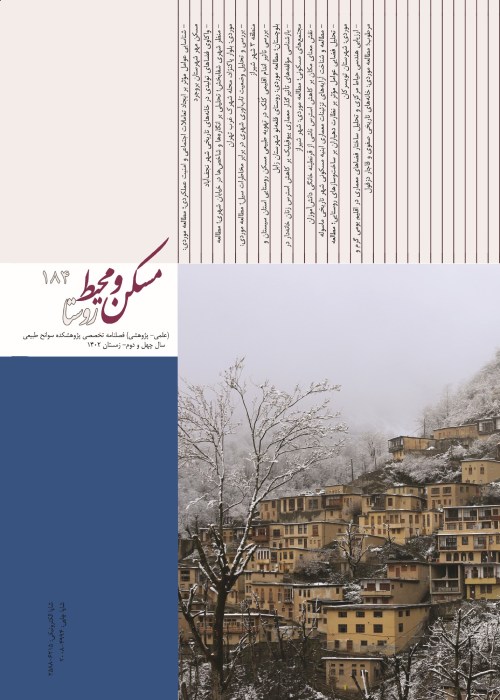Neighbourhood rights in the context of the geomorphological limitations of rural settlements (Case study: Oraman Takht village)
Author(s):
Abstract:
Iranian-Islamic architecture and urbanity as an approach inherited from traditional uran development present specific patterns of planning and management of Iranian historic cities. Nowadays, these patterns can be observed in traditional cities and villages. These patterns have been always in harmony with local climate, environment and social condition. Some of the settlements with specific spatial patterns that have been shaped according to the local geomorphological constraints present a specific model of settlement. Neighborhood right as one of the basic rights in Iranian-Islamic system have been embedded in all human settlements and observed through traditions, behaviors and principle social codes of conduct.
Oraman Takht village of Kurdistan presents a particular residential pattern where contemporary urban rules and regulations are in conflict with neighborhood rights.. Therefore, this research seeks to answer the following questions: how neighborhood rights can be defined in the context of the interaction between ownership rights and public interests? And, how the process of dealing with legal conflicts through customary agreement can be conducive to the realization of neighborhood rights?
This research relies on examining the holy Quran as well as contemporary laws and regulations. Adopting a descriptive approach, the paper addresses the research questions using holy Quran teachings and field observations in social and built environment of the Oraman Takht village. Masooleh village in Gilan and Oramannat villlage in Kordistan are presented and analyzed as our case-studies.
The findings of the research determine how customary agreements can present a way for the sustainability of settlement development and observing neighborhood rights. This sustainability can be achieved in the context of conflicts between ownership rights and public interests; This implies that urban laws and regulations and ownership rights cannot - on their own ensure the sustainable development of social and built environment in settlements like Oraman Takht. Through this traditional process, legal conflict can be addressed through social agreements based on traditional customs of the society
This research also shows that climatic, environmental and social conditions of settlements, creates an environment where social interactions are not formed based on formal codes, and regulations, but on the basis of social customs that balances the interaction between private property rights and public interests. In this traditional process, the legal conflicts are transformed to social agreements. This issue arises not from a gap in laws and regulations, but from the conflicts that arise between private property rights and public interests in private and public places. This conflict cannot be addressed in the domain of formal laws and regulations, but within the common laws of the society. Addressing such conflicts is possible through a shift from law-based conflict of interests to custom-based agreement for achieving neighborhood rights.
Oraman Takht village of Kurdistan presents a particular residential pattern where contemporary urban rules and regulations are in conflict with neighborhood rights.. Therefore, this research seeks to answer the following questions: how neighborhood rights can be defined in the context of the interaction between ownership rights and public interests? And, how the process of dealing with legal conflicts through customary agreement can be conducive to the realization of neighborhood rights?
This research relies on examining the holy Quran as well as contemporary laws and regulations. Adopting a descriptive approach, the paper addresses the research questions using holy Quran teachings and field observations in social and built environment of the Oraman Takht village. Masooleh village in Gilan and Oramannat villlage in Kordistan are presented and analyzed as our case-studies.
The findings of the research determine how customary agreements can present a way for the sustainability of settlement development and observing neighborhood rights. This sustainability can be achieved in the context of conflicts between ownership rights and public interests; This implies that urban laws and regulations and ownership rights cannot - on their own ensure the sustainable development of social and built environment in settlements like Oraman Takht. Through this traditional process, legal conflict can be addressed through social agreements based on traditional customs of the society
This research also shows that climatic, environmental and social conditions of settlements, creates an environment where social interactions are not formed based on formal codes, and regulations, but on the basis of social customs that balances the interaction between private property rights and public interests. In this traditional process, the legal conflicts are transformed to social agreements. This issue arises not from a gap in laws and regulations, but from the conflicts that arise between private property rights and public interests in private and public places. This conflict cannot be addressed in the domain of formal laws and regulations, but within the common laws of the society. Addressing such conflicts is possible through a shift from law-based conflict of interests to custom-based agreement for achieving neighborhood rights.
Keywords:
Language:
Persian
Published:
Housing And Rural Environment, Volume:36 Issue: 157, 2017
Pages:
131 to 148
magiran.com/p1700065
دانلود و مطالعه متن این مقاله با یکی از روشهای زیر امکان پذیر است:
اشتراک شخصی
با عضویت و پرداخت آنلاین حق اشتراک یکساله به مبلغ 1,390,000ريال میتوانید 70 عنوان مطلب دانلود کنید!
اشتراک سازمانی
به کتابخانه دانشگاه یا محل کار خود پیشنهاد کنید تا اشتراک سازمانی این پایگاه را برای دسترسی نامحدود همه کاربران به متن مطالب تهیه نمایند!
توجه!
- حق عضویت دریافتی صرف حمایت از نشریات عضو و نگهداری، تکمیل و توسعه مگیران میشود.
- پرداخت حق اشتراک و دانلود مقالات اجازه بازنشر آن در سایر رسانههای چاپی و دیجیتال را به کاربر نمیدهد.
In order to view content subscription is required
Personal subscription
Subscribe magiran.com for 70 € euros via PayPal and download 70 articles during a year.
Organization subscription
Please contact us to subscribe your university or library for unlimited access!


